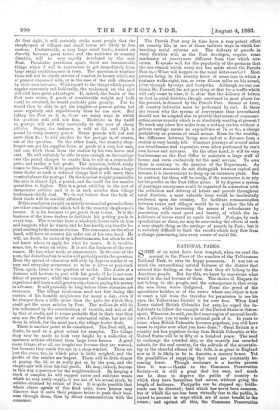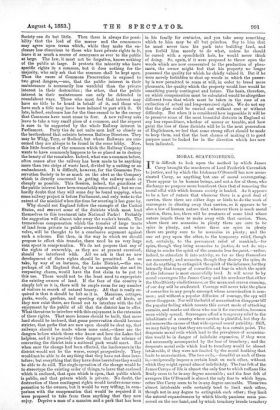NATIONAL PARKS.
SOME of us must have been tempted, when we read the account in the Times of the wonders of the Yellowstone National Park, to envy its happy possessors. It was not so much the extraordinary natural features of the district that aroused this feeling, as the fact that they all belong to the American people. But for this, we know by experience what would in the end become of them. The shores of Niagara do not belong to the people, and the consequence is that every day sees them worse disfigured. From the greed of the speculative builder, or of the owner whose one object is how to exact a toll from the traveller fer permission to use his eyes, the Yellowstone District is for ever free. When Lord Lorne visited British Columbia last year, he urged the in- habitants to follow the example of the United States in this re- spect. Wherever, he said, you find some region of unusual loveli- ness, I advise you to make a national park of it. In years to come, when British Columbia becomes populous, you will have cause to rejoice over what you have done." Great Britain is a country not less populous to-day than British Columbia or the United States will be in fifty or a hundred years. The need to exchange the crowded city, or the scarcely less crowded suburb, for the real country, for the solitude of the mountain- top or the cheerful silence of the fells, is as great in England now as it is likely to be in America a century hence. Yet the possibilities of supplying that need are constantly be- coming fewer. Though enclosure is a harder process than it was —thanks to the Commons Preservation Society—it is still a great deal too easy, and much can be done to deprive the public of country to which they have heretofore had access, without going the length of inclosure. Footpaths can be stopped up; bridle- roads can be diverted ; land which has never been common, but of which the use has been virtually free to the public, is turned to account in ways which are of more benefit to the owner ; and against all this, the Commons Preservation
Society can do but little. Then there is always the possi- bility that the lord of the manor and the commoners may agree upon terms which, while they make the en- closure less obnoxious to those who have private rights in it, leave it as much a source of annoyance as ever to the public at large. The law, it must not be forgotten, knows nothing of the public at large. It protects the minority who have specific rights in a common, but it does nothing for the -majority, who only ask that the common shall be kept open. Thus the cause of Commons Preservation is exposed to two great dangers,—one, that the public interest in their maintenance is necessarily less watchful than the private interest in their destruction ; the other, that the public interest in their maintenance can only be defended in roundabout ways. Those who most feel that interest may have no title to be heard in behalf of it, and those who have such a title may have been induced to part with it. Of late, indeed, enclosure has for the time ceased to be the enemy that Commons have most cause to fear. A new railway asks leave to take a very small piece of a common, and the request is sure to be supported by the whole Railway interest in Parliament. Party ties do not unite men half so closely as the brotherhood that subsists between Railway Directors. They may be Whig, Tory, or Radical, but where Railways are con- cerned they are always to be found in the same lobby. Now, this little fraction of the common which the Railway Company wants to have commonly happens to be so placed as to destroy the beauty of the remainder. Indeed, what was a common before, often ceases after the railway has been made to be anything more than two strips of waste land, divided by a cutting or an embankment. It is difficult, however, for the Commons Pre- servation Society to be as much on the alert as the Company which is directly concerned in getting the railway made as cheaply as possible. This Session, indeed, the guardians of the public interest have been remarkably successful ; but we can hardly doubt that they will some day be found napping, when some railway project is before Parliament, and only wake to the extent of the mischief when the time for averting it has gone by.
Why should not England follow the example of the United States, and (*Invert some of the districts which most lend themselves to this treatment into National Parks? Probably the suggestion will almost take away the reader's breath. The tremendous compensation which the transfer of large tracts of land from private to public ownership would seem to in- volve, will be thought to be a conclusive argument against such a scheme. But then, in the way in which we should propose to effect this transfer, there need be no very large sum spent in compensation. We do not propose that any of the rights of ownership, as they are at present exercised, should be interfered with. All we ask is that no new development of these rights should be permitted. Let us take, by way of an instance, the Lake District,—the one, perhaps, of all England that, by its manageable size and its surpassing charm, would have the first claim to be put to this use. There would not be the least need to expropriate the existing owners of land. If the face of the country is simply left as it is, there will be ample room for any number of visitors in search of natural beauty. All that is really re- quired is that it should be left as it is. Mansions, cottages, parks, woods, gardens, and sporting rights of all kinds, as they now exist there, are found not to interfere with the full enjoyment by the public of all that the district has to offer. What threatens to interfere with this enjoyment is the extension of these rights. That more houses should be built, that more land should be inclosed, that game preservation should become stricter, that paths that are now open should be shut up, that railways should be made where none exist,—these are the dangers before which those who know and love the Lakes feel helpless, and it is precisely these dangers that the scheme of converting the district into a national park would meet. But when once the change had been effected, the landowners in the district -would not be the worse, except prospectively. They would not be able to do anything that they have not done here- tofore ; but everything that they have done heretofore they would be able to do still. The single operation of the change would be to stereotype the existing order of things, to leave that enclosed which is enclosed, that open which is open, that public which is public, and that private which is private. No doubt, the destruction of these contingent rights would involve some com- pensation to the owners, but it would be very trifling, in com- parison with the compensation that would be required if it were proposed to take from them anything that they now enjoy. Deprive a man of a mansion and a park that has been
in his family for centuries, and you take away something which to him may be all but priceless. Say to him that he must never turn his park into building land, and you forbid him merely to do what, unless he should be cursed with a spendthrift heir, he would never think of doing. So, again, if it were proposed to throw open the woods which are now consecrated to the production of phea- sants, the owner might feel that his property no longer possessed the quality for which he chiefly valued it. But if he
• were merely forbidden to shut up woods in which the passer- by is now permitted to roam at will, in order to breed more pheasants, the quality which the property would lose would be something purely contingent and future. The basis, therefore, on which compensation must be calculated would be altogether different from that which must be taken in the case of an extinction of actual and long-exercised rights. We do not say that the plan could be carried out without cost or without difficulty. But when it is considered how impossible it will be to preserve some of the most beautiful districts in England at any less expenditure, whether of money or trouble, and how great the loss of these districts will be to the next generation of Englishmen, we feel that some strong effort should be made to keep them, and that the best chance of making it to good purpose must be looked for in the direction which has now been indicated.



































 Previous page
Previous page